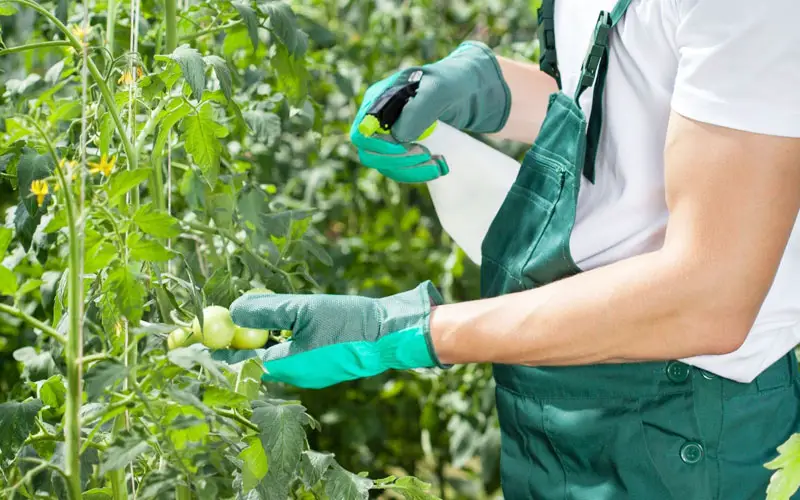Many of us heard about different home remedies using vinegar in gardens. Mainly as an herbicide. But if vinegar can kill weeds, what about tomato plants? Can vinegar kill tomato plants?

First of all, the acetic acid found in vinegar could indeed kill weeds when in contact, by dissolving the cell membranes resulting in desiccation of tissues and death of the plants.
Therefore, vinegar could kill your tomato plants and other vegetables in your garden.
Second, if vinegar is used to kill weeds, what else can vinegar do in our garden, and how effective is it?
In this article, you can find out how to use vinegar in the garden.
Using Vinegar for Tomato Plants
I am sure you heard from your neighbor, mother, or grandparents that vinegar can be beneficial in your garden for your tomato plants in many ways.
Fertilizer
Many people think that pouring vinegar into the soil can be a good fertilizer for tomato plants.
Nope. Most kinds of vinegar contain 4-7% acetic acid and 93-96% water. Acetic acid’s chemical compound is carbon hydrogen and oxygen.
The tomato plants can easily get these two ingredients from the air. So, there is no need to pour vinegar on the tomato plants or their soil.
Raise the Acidity
Some people recommend using vinegar to raise the acidity of the soil.
However, apparently, this is not the best way of doing it. The effects are only temporary and you need a large amount of vinegar to have any noteworthy effect.
So, instead of vinegar, you can use other natural ingredients to raise the acidity of the soil, such as dolomite lime, coffee, or even tea bags.
Fungicide
Another widespread use of vinegar with tomato plants is as a fungicide.
As these plants are prone to many fungal diseases, some people mix 2-3 tablespoons of vinegar into 1 gallon of water and then spray the tomato leaves with the mixture.
Vinegar is naturally antibacterial and antifungal and is often used in household cleaning. But not all types and are not antibacterial by 99.99%.
If you prefer using vinegar as an antifungal for your tomato plants, you risk burning the leaves and even killing the plant. If the mixture is too strong, it can easily kill your tomato plant.
Instead, try using an antifungal that is made especially for plants and is safe to use in your garden.
Vinegar as Herbicides
The most common use of vinegar in the garden is as an herbicide. However, this is not the best choice when it comes to killing weeds.
Vinegar kills the plant when the acetic acid disrupts the cell walls. But this is only temporary because the roots will not be killed, as the vinegar touches only the leaves and stems.
Household vinegar is not strong enough to kill the weed completely. The roots will survive and grow new weeds.
Another thing you should be aware of is that if the vinegar kills the weed, it can kill your tomato plants as well.
Instead of using household vinegar, you can use horticultural vinegar, which is 20% acetic acid, or even higher. This will definitely kill your weeds; however, it is a strong corrosive acid, that can do more harm than good to your garden.
That is why you need to follow strict guidelines to use it safely.
So, you should decide wisely whether you want to use strong acids in your garden, or just pull out the weeds by yourself.
Using Vinegar in Your Garden
Instead of using vinegar as herbicide or fertilizer and risk doing more harm than good, you can use it wisely in other ways.
- Using vinegar to freshen up your cut flowers is a good idea. Only 30 ml (2 tablespoons) of vinegar added to 1 tablespoon of sugar for each quart of water, will keep your cut flowers alive for longer.
- By spraying vinegar around doors and window frames, you can keep away the ants, spiders, and other unwanted insects from your house.
- You can also use vinegar to clean the build-up calcium from bricks or limestone by using half vinegar and half water. Just spray the mixture on and let it set.
- Undiluted vinegar can be used to clean rust off taps, spigots, or garden tools. Soak these in clean vinegar overnight and let the magic happen.
- You can also remove odors from your garden, and even dogs’ fur by rubbing the vinegar in.
Wrap Up
Using vinegar as an herbicide is possible, but it is not the best idea. Just like weeds, your tomato plants can be killed by the use of vinegar. Instead, use a proper herbicide that is safe to use in the garden.
And for your tomato plants, you should use proper fertilizer and fungicides, not vinegar.
I think that vinegar should be used in the kitchen for cooking or as a natural cleaner in and around our house.

